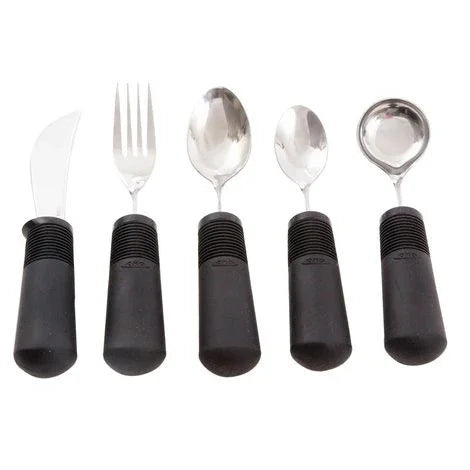As individuals age, they may face challenges with everyday tasks such as eating. One solution that has been found to be beneficial for the elderly is the use of weighted utensils. These specialized utensils are designed to provide added stability and control, making mealtime easier and more enjoyable for seniors.
What are weighted utensils?
Weighted utensils are eating and drinking tools that have additional weight added to them. This extra weight helps to steady the utensil, reducing tremors and improving control for individuals with conditions such as Parkinson's disease, arthritis, or other mobility issues.
How do weighted utensils work?
The added weight in the utensils provides proprioceptive feedback to the user, helping them better sense the position of their hand and the movement of the utensil. This increased awareness can lead to improved coordination and stability while eating, allowing for a more independent dining experience.
What are the benefits of using weighted utensils?
Studies have shown that using weighted utensils can lead to a variety of benefits for the elderly. These include increased food intake, improved eating speed, reduced mealtime frustration, and enhanced overall dining experience. In fact, research has found that individuals using weighted utensils consume up to 84% more food compared to those using standard utensils.
How to choose the right weighted utensils?
When selecting weighted utensils for the elderly, it is important to consider factors such as the individual's specific needs and preferences. Look for utensils that are comfortable to hold, easy to grip, and have the appropriate weight for the user's level of dexterity. Additionally, choosing utensils with non-slip handles can further enhance stability and control during mealtime.
Overall, weighted utensils can be a valuable tool for improving independence and quality of life for the elderly. By providing added stability and control, these specialized utensils can help seniors enjoy their meals with greater ease and confidence.
As individuals age, they may face challenges with everyday tasks such as eating. One solution that has been found to be beneficial for the elderly is the use of weighted utensils. These specialized utensils are designed to provide added stability and control, making mealtime easier and more enjoyable for seniors.
What are weighted utensils?
Weighted utensils are eating and drinking tools that have additional weight added to them. This extra weight helps to steady the utensil, reducing tremors and improving control for individuals with conditions such as Parkinson's disease, arthritis, or other mobility issues.
How do weighted utensils work?
The added weight in the utensils provides proprioceptive feedback to the user, helping them better sense the position of their hand and the movement of the utensil. This increased awareness can lead to improved coordination and stability while eating, allowing for a more independent dining experience.
What are the benefits of using weighted utensils?
Studies have shown that using weighted utensils can lead to a variety of benefits for the elderly. These include increased food intake, improved eating speed, reduced mealtime frustration, and enhanced overall dining experience. In fact, research has found that individuals using weighted utensils consume up to 84% more food compared to those using standard utensils.
How to choose the right weighted utensils?
When selecting weighted utensils for the elderly, it is important to consider factors such as the individual's specific needs and preferences. Look for utensils that are comfortable to hold, easy to grip, and have the appropriate weight for the user's level of dexterity. Additionally, choosing utensils with non-slip handles can further enhance stability and control during mealtime.
Overall, weighted utensils can be a valuable tool for improving independence and quality of life for the elderly. By providing added stability and control, these specialized utensils can help seniors enjoy their meals with greater ease and confidence.
Mealtime should be a time of enjoyment and relaxation, but for some individuals, it can be a challenging experience. Whether due to motor skill difficulties or tremors, eating with traditional utensils can be frustrating and even discouraging. However, there is a solution that can make mealtime more manageable and enjoyable: weighted utensils.
What are weighted utensils?
Weighted utensils are specially designed eating tools that have added weight to them. The additional weight helps to stabilize the utensil, making it easier to control and reducing tremors. This can make a significant difference for individuals who struggle with fine motor skills or have conditions such as Parkinson's disease or essential tremor.
How do weighted utensils work?
The added weight in the utensils provides proprioceptive feedback to the user, which can help improve coordination and control. By increasing the sensory input during mealtime, weighted utensils can enhance the user's ability to bring food to their mouth with greater ease and confidence.
Benefits of using weighted utensils
Using weighted utensils can have a variety of benefits for individuals with motor skill challenges. Some of the key advantages include:
- Improved control and stability
- Reduced tremors
- Increased independence during mealtime
- Enhanced confidence and enjoyment of eating
How to choose the right weighted utensils
When selecting weighted utensils, it's essential to consider the individual's specific needs and preferences. Factors to keep in mind include the weight of the utensils, the size and shape of the handles, and the material they are made from. It may be helpful to try out different options to find the best fit for the user.
Overall, weighted utensils can be a game-changer for individuals who struggle with motor skills or tremors during mealtime. By providing added stability and control, these specialized utensils can help make eating a more enjoyable and empowering experience.







